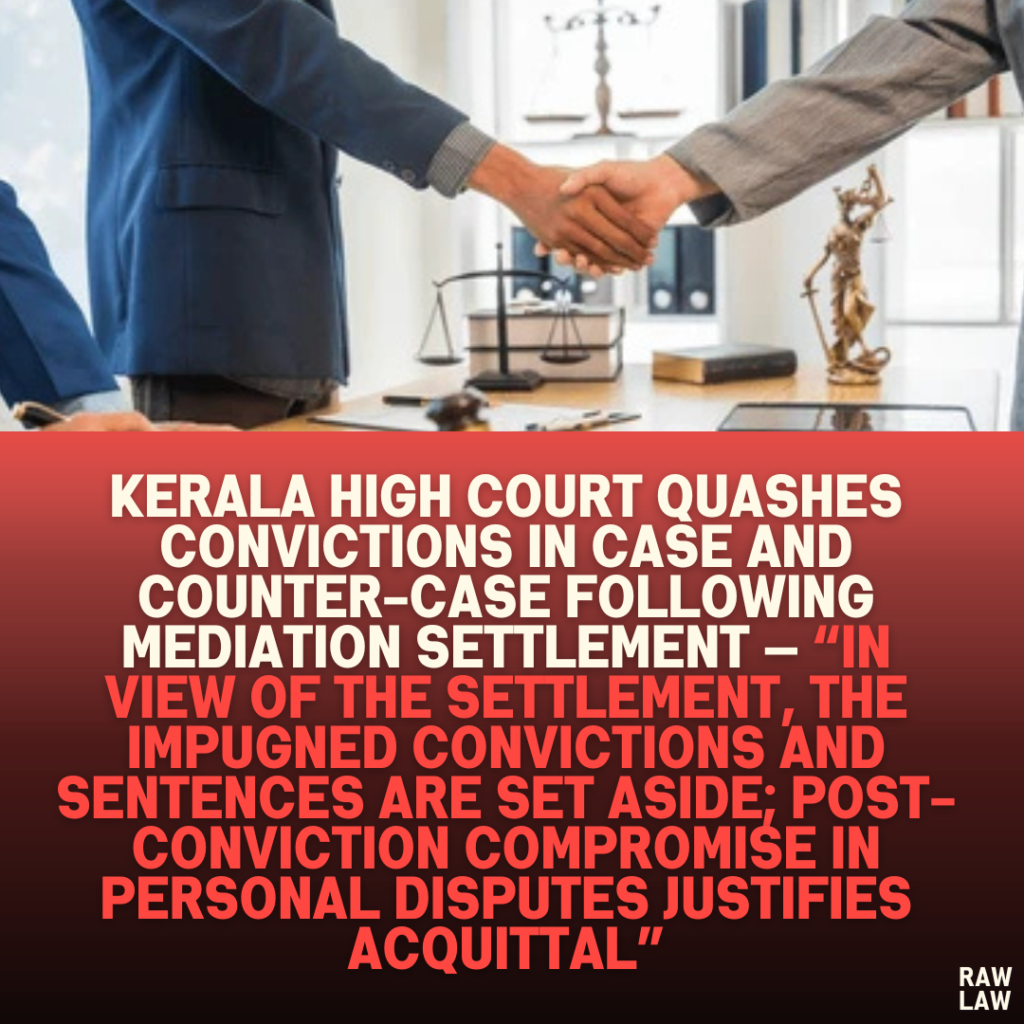Court’s Decision
The Kerala High Court allowed two criminal revision petitions—Crl. Rev. Pet. No. 1785 of 2014 and Crl. Rev. Pet. No. 396 of 2015—arising from a case and counter-case scenario. It quashed the concurrent convictions and sentences imposed by the Magistrate Court and the Additional Sessions Court in both proceedings. The Court noted that the parties had amicably settled their disputes through mediation and stated:
“In view of the settlement, the impugned convictions and sentences in both cases are hereby set aside and the accused are acquitted.”
The criminal revision petitions were accordingly disposed of in terms of the settlement, which was recorded and made a part of the judgment.
Facts
- Case No. 1: C.C. No. 905 of 2003 was tried before the Judicial First Class Magistrate Court-II, Perinthalmanna. An appeal (Crl.A. No. 315 of 2007) against the conviction was dismissed by the Additional Sessions Court-II, Manjeri.
- Case No. 2: C.C. No. 508 of 2004 was a counter case, also tried before the same Magistrate Court. The appeal (Crl.A. No. 334 of 2010) was dismissed by the same Additional Sessions Court.
- Both proceedings stemmed from a single incident and constituted a case and counter-case.
- During pendency of the criminal revision petitions, the parties participated in mediation.
- A mutual settlement agreement was executed, wherein both parties agreed not to pursue either case.
Issues
- Whether the concurrent findings of conviction and sentence in both cases warranted interference in revision.
- Whether a post-conviction settlement between the parties justified setting aside the convictions and acquitting the accused in both case and counter-case.
Petitioners’ Arguments
- The petitioners in both revision petitions challenged the legality and correctness of the concurrent findings of guilt and the sentences imposed by the lower courts.
- They relied on the post-conviction settlement and contended that since the disputes had been amicably resolved, further continuation of the proceedings would serve no purpose.
- They prayed that the convictions and sentences be quashed in light of the settlement.
Respondents’ Arguments
- The State was represented by the Public Prosecutor, who did not oppose the settlement.
- The de facto complainant(s) participated in the mediation and voluntarily agreed to withdraw the complaints, consenting to the quashing of proceedings.
Analysis of the Law
- Although not elaborated in detail in the order, the legal principle applicable here stems from the Supreme Court’s consistent jurisprudence allowing quashing of criminal proceedings, including post-conviction, particularly in cases involving personal disputes, where both parties voluntarily settle.
- The Court, exercising its inherent powers, considered the nature of the offence and the fact that the cases were personal in nature and did not involve offences against society at large.
Precedent Analysis
While the order does not cite specific precedents, the decision aligns with established principles laid down in several Supreme Court cases, including:
- Gian Singh v. State of Punjab, (2012) 10 SCC 303 – Held that the High Court has power to quash criminal proceedings, even post-conviction, if the offence is of a private nature and parties have amicably settled the matter.
- Narinder Singh v. State of Punjab, (2014) 6 SCC 466 – Clarified when criminal proceedings can be quashed on the basis of a compromise.
These cases provide the legal justification for quashing proceedings post-conviction in compoundable and personal disputes, especially when the settlement is genuine and voluntary.
Court’s Reasoning
- The Court noted that both parties had appeared for mediation and voluntarily agreed not to proceed with the cases.
- The mutual settlement was considered genuine and reflective of complete resolution of the underlying dispute.
- Therefore, in the interest of justice and to avoid unnecessary continuation of litigations, the Court found it appropriate to set aside the convictions and acquit the accused.
Conclusion
The Kerala High Court allowed the revision petitions, quashed the concurrent convictions and sentences in both the case and the counter-case, and acquitted the accused. The Court held:
“The impugned convictions and sentences in both cases are hereby set aside and the accused are acquitted.”
The memorandum of settlement agreement was directed to be made part of the Court’s order.
Implications
- The judgment reinforces the judicial approach of encouraging amicable settlements in personal disputes, especially in case and counter-case scenarios.
- It highlights the High Court’s power to quash even final convictions if parties resolve their differences and the offences are not of a serious or public nature.
- The decision promotes alternative dispute resolution through mediation, reducing burden on the courts and restoring social harmony.



